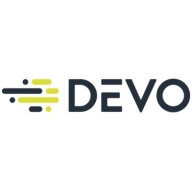
![i-SIEM [EOL] Logo](https://images.peerspot.com/image/upload/c_scale,dpr_3.0,f_auto,q_100,w_64/1n8rehhnj5whg5rso78w2pq8ws0r.jpg)
Devo and i-SIEM [EOL] are competing products in the security information and event management space. Devo appears stronger in customer support, while i-SIEM [EOL] is preferred for advanced functionalities.
Features: Devo offers real-time data processing, extensive integrations, and flexibility in handling large-scale data. i-SIEM [EOL] provides advanced threat detection, deep analytics, and proactive incident management, prioritizing security insights over flexibility.
Ease of Deployment and Customer Service: Devo ensures a streamlined cloud-based deployment with strong customer support for smooth implementation. i-SIEM [EOL] allows both on-premise and cloud solutions, offering deployment flexibility but requires more configuration effort.
Pricing and ROI: Devo aligns its setup costs with comprehensive support, leading to a potentially quicker ROI due to efficient operations. i-SIEM [EOL] may involve higher initial investments, with its feature set justifying the cost for those seeking extensive security insights.

Devo is the only cloud-native logging and security analytics platform that releases the full potential of all your data to empower bold, confident action when it matters most. Only the Devo platform delivers the powerful combination of real-time visibility, high-performance analytics, scalability, multitenancy, and low TCO crucial for monitoring and securing business operations as enterprises accelerate their shift to the cloud.
i-SIEM [EOL] delivers comprehensive monitoring and threat detection capabilities suitable for today's security challenges. It integrates with existing systems, enabling efficient threat analysis and response for knowledgeable users.
i-SIEM [EOL] offers advanced security analytics and seamless integration with security infrastructure, making it a favored choice among technology professionals. Its intuitive design caters to efficient threat management. Users appreciate its capability to process large data volumes for timely threat detection and remediation. The platform ensures effective incident response through automated processes, assisting professionals in maintaining robust security postures.
What are the key features of i-SIEM [EOL]?i-SIEM [EOL] is implemented across industries like finance, healthcare, and manufacturing, where security and compliance are critical. Its flexibility in handling specific industry requirements makes it suitable for enhancing security postures and operational efficiency.
We monitor all Security Information and Event Management (SIEM) reviews to prevent fraudulent reviews and keep review quality high. We do not post reviews by company employees or direct competitors. We validate each review for authenticity via cross-reference with LinkedIn, and personal follow-up with the reviewer when necessary.